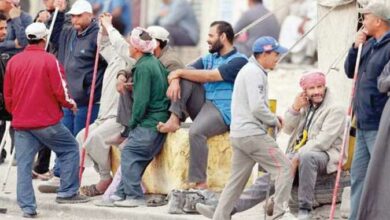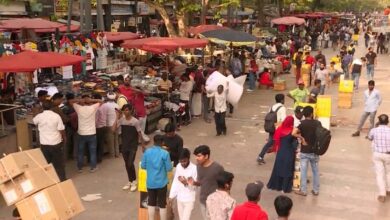Workers in the Egyptian city of Mahalla, a hub for the labor movement and one of the most industrial cities in Egypt, are protesting against poor employment conditions, low wages and the persistently unhelpful government responses to their demands.
According to news reports, in light of workers' growing dissatisfaction in various sectors in Egypt, the over 250,000 workers in Mahalla represent a significant threat to the government if it continues its intransigence towards their demands.
This threat is more than evident in the city, which is located nearly 110 km north of Cairo, and which contains hundreds of factories, including nearly 472 textile mills.
In 2008, during the largest strike the country has ever witnessed, Mahalla's workers protested soaring prices and low wages. On 6 and 7 April that year, violent clashes erupted between security forces and protesters who set the now-dissolved National Democratic Party’s headquarters on fire and chanted slogans against then-President Hosni Mubarak.
Observers believe that employees of the Misr Spinning and Weaving Factory could spark another revolution in Egypt.
The factory is owned by the Egyptian Holding Company for Spinning and Weaving and is the second largest textile factory in the Middle East, both in terms of production and employment, with more than 22,000 workers.
Workers at the factory complain about an old-fashioned wage system, an unfair career progression policy, and poor social and health services. They say the state is running the factory through the holding company in a manner that does not live up to the factory’s history or the workers who ignited the 2008 strike.
Fifty-two-year-old Mahdi Abdel Wahab, one of the factory’s labor leaders said, "It is incomprehensible that I have been working at the factory for 28 years and have never seen any open and consistent plans for promotions and raises… Most of the factory workers find this to be unfair."
The workers are demanding the amendment of certain administration provisions. According to Abdul Wahab, the factory's management has deliberately avoided signing formal contracts with some of its workers in order to bypass a commitment to pensions.
Factory worker Sebaei Attia, 34, complained of the poor healthcare provided. He said that although the factory has a private hospital, its doctors do not make adequate effort in taking care of workers.
Nearly two weeks ago, the workers threatened to strike. On 10 September, they marched to the cabinet headquarters in Cairo to demand the promised LE700 minimum wage for the current fiscal year, in addition to late financial incentives and meal re-imbursements.
In fear of the planned strike, the factory's management soon promised to apply the minimum wage starting in October.
In July, after the workers declared an open-ended strike until their main demand was achieved, the government sacked the company chairman, Fouad Abdel-Alim, who workers described as an icon of the Mubarak regime in the industry.
However, Abdel Wahab said the new chairman was facing intransigence from the holding company over many matters concerning the implementation of the workers’ demands, as he is not in favor with the board members and has no mutual interests with them.
Internal elections to select members of the company’s trade union to represent the workers in the Egyptian General Federation of Trade Unions are expected to be held soon. However, company insiders say that none of the proposed candidates would be an acceptable representative capable of expressing the workers' demands.
Meanwhile, teachers in Mahalla also complained that the government has continued to ignore their demands. Teachers in the city are some of the most organized and active participants in the nationwide teacher protests that began on Saturday.
On Saturday, police failed to break up a strike organized by a number of schools after teachers demanded the dismissal of Education Minister Ahmed Gamal Eddin Moussa, as well as salary increases and curriculum amendments.
Samir al-Sharif, a striking teacher and a member of committee formed by a number of teachers' unions to negotiate with the government, said, "We presented our demands to the Supreme Council of the Armed Forces and the cabinet in 16 specific points agreed upon by teachers."
Sherif said that 17 of the 30 schools in Mahalla have announced their participation in the strike. He said the strike will not end until the demands are met, and that he expected more teachers to join within the next few days.




